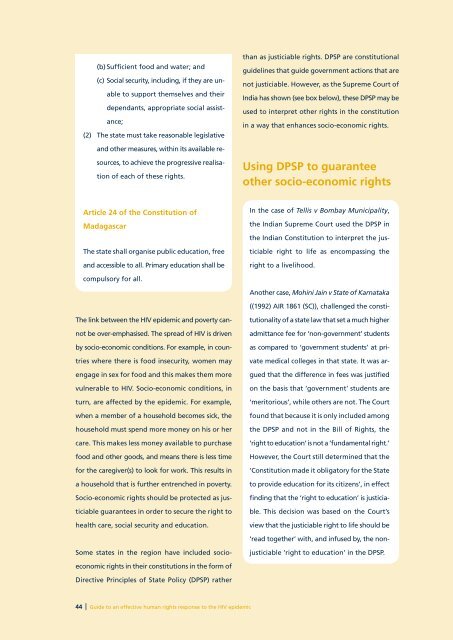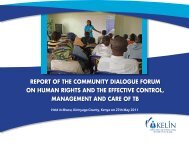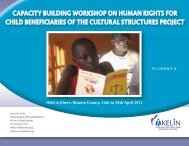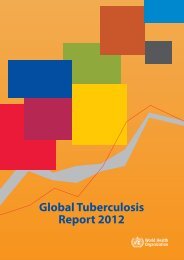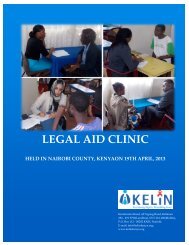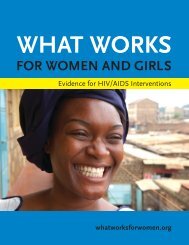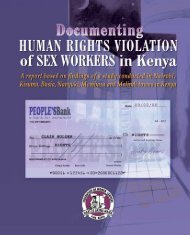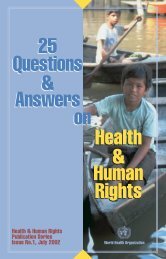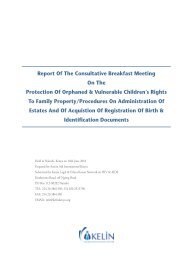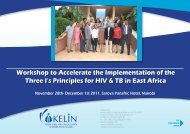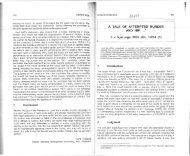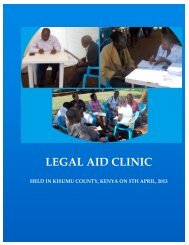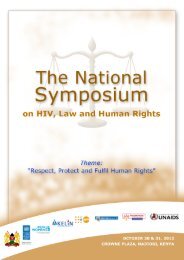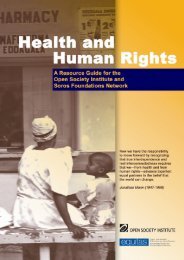Guide to an effective human rights response to the HIV epidemic
Guide to an effective human rights response to the HIV epidemic
Guide to an effective human rights response to the HIV epidemic
You also want an ePaper? Increase the reach of your titles
YUMPU automatically turns print PDFs into web optimized ePapers that Google loves.
(b) Sufficient food <strong>an</strong>d water; <strong>an</strong>d<br />
(c) Social security, including, if <strong>the</strong>y are unable<br />
<strong>to</strong> support <strong>the</strong>mselves <strong>an</strong>d <strong>the</strong>ir<br />
depend<strong>an</strong>ts, appropriate social assist<strong>an</strong>ce;<br />
(2) The state must take reasonable legislative<br />
th<strong>an</strong> as justiciable <strong>rights</strong>. DPSP are constitutional<br />
guidelines that guide government actions that are<br />
not justiciable. However, as <strong>the</strong> Supreme Court of<br />
India has shown (see box below), <strong>the</strong>se DPSP may be<br />
used <strong>to</strong> interpret o<strong>the</strong>r <strong>rights</strong> in <strong>the</strong> constitution<br />
in a way that enh<strong>an</strong>ces socio-economic <strong>rights</strong>.<br />
<strong>an</strong>d o<strong>the</strong>r measures, within its available resources,<br />
<strong>to</strong> achieve <strong>the</strong> progressive realisation<br />
of each of <strong>the</strong>se <strong>rights</strong>.<br />
Using DPSP <strong>to</strong> guar<strong>an</strong>tee<br />
o<strong>the</strong>r socio-economic <strong>rights</strong><br />
Article 24 of <strong>the</strong> Constitution of<br />
Madagascar<br />
The state shall org<strong>an</strong>ise public education, free<br />
<strong>an</strong>d accessible <strong>to</strong> all. Primary education shall be<br />
In <strong>the</strong> case of Tellis v Bombay Municipality,<br />
<strong>the</strong> Indi<strong>an</strong> Supreme Court used <strong>the</strong> DPSP in<br />
<strong>the</strong> Indi<strong>an</strong> Constitution <strong>to</strong> interpret <strong>the</strong> justiciable<br />
right <strong>to</strong> life as encompassing <strong>the</strong><br />
right <strong>to</strong> a livelihood.<br />
compulsory for all.<br />
Ano<strong>the</strong>r case, Mohini Jain v State of Karnataka<br />
The link between <strong>the</strong> <strong>HIV</strong> <strong>epidemic</strong> <strong>an</strong>d poverty c<strong>an</strong>not<br />
be over-emphasised. The spread of <strong>HIV</strong> is driven<br />
by socio-economic conditions. For example, in countries<br />
where <strong>the</strong>re is food insecurity, women may<br />
engage in sex for food <strong>an</strong>d this makes <strong>the</strong>m more<br />
vulnerable <strong>to</strong> <strong>HIV</strong>. Socio-economic conditions, in<br />
turn, are affected by <strong>the</strong> <strong>epidemic</strong>. For example,<br />
when a member of a household becomes sick, <strong>the</strong><br />
household must spend more money on his or her<br />
care. This makes less money available <strong>to</strong> purchase<br />
food <strong>an</strong>d o<strong>the</strong>r goods, <strong>an</strong>d me<strong>an</strong>s <strong>the</strong>re is less time<br />
for <strong>the</strong> caregiver(s) <strong>to</strong> look for work. This results in<br />
a household that is fur<strong>the</strong>r entrenched in poverty.<br />
Socio-economic <strong>rights</strong> should be protected as justiciable<br />
guar<strong>an</strong>tees in order <strong>to</strong> secure <strong>the</strong> right <strong>to</strong><br />
health care, social security <strong>an</strong>d education.<br />
((1992) AIR 1861 (SC)), challenged <strong>the</strong> constitutionality<br />
of a state law that set a much higher<br />
admitt<strong>an</strong>ce fee for ‘non-government’ students<br />
as compared <strong>to</strong> ‘government students’ at private<br />
medical colleges in that state. It was argued<br />
that <strong>the</strong> difference in fees was justified<br />
on <strong>the</strong> basis that ‘government’ students are<br />
‘meri<strong>to</strong>rious’, while o<strong>the</strong>rs are not. The Court<br />
found that because it is only included among<br />
<strong>the</strong> DPSP <strong>an</strong>d not in <strong>the</strong> Bill of Rights, <strong>the</strong><br />
‘right <strong>to</strong> education’ is not a ‘fundamental right.’<br />
However, <strong>the</strong> Court still determined that <strong>the</strong><br />
‘Constitution made it obliga<strong>to</strong>ry for <strong>the</strong> State<br />
<strong>to</strong> provide education for its citizens’, in effect<br />
finding that <strong>the</strong> ‘right <strong>to</strong> education’ is justiciable.<br />
This decision was based on <strong>the</strong> Court’s<br />
view that <strong>the</strong> justiciable right <strong>to</strong> life should be<br />
‘read <strong>to</strong>ge<strong>the</strong>r’ with, <strong>an</strong>d infused by, <strong>the</strong> nonjusticiable<br />
‘right <strong>to</strong> education’ in <strong>the</strong> DPSP.<br />
Some states in <strong>the</strong> region have included socioeconomic<br />
<strong>rights</strong> in <strong>the</strong>ir constitutions in <strong>the</strong> form of<br />
Directive Principles of State Policy (DPSP) ra<strong>the</strong>r<br />
44 | <strong>Guide</strong> <strong>to</strong> <strong>an</strong> <strong>effective</strong> hum<strong>an</strong> <strong>rights</strong> <strong>response</strong> <strong>to</strong> <strong>the</strong> <strong>HIV</strong> <strong>epidemic</strong>


